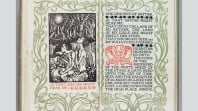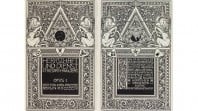Private press
Private presses are presses operated by an individual or small group, for the purpose of producing small editions of finely printed books. We hold many examples of these deluxe publications from the most significant private presses of the late 19th and 20th century, including the Kelmscott Press, Doves Press, Eragny Press and Golden Cockerel Press.
The private press, or fine press, movement began in Britain in the late 19th century in direct response to the impacts of the Industrial Revolution. Mechanised printing had enabled the mass production and distribution of books to broader audiences, but at the same time such practices often resulted in unattractive or poorly produced books.
William Morris, the founder of the Arts and Crafts Movement, is credited with returning the book to its role as art object through the revival of the traditional book arts. His Kelmscott Press, founded at his home in 1891, sought to combine the aesthetics of medieval manuscripts with the crafts of early printing. Morris designed the Kelmscott types and the books were printed on handmade papers with specially made inks.
The Kelmscott Press lasted only six years, but it spawned an international movement that continues today. Some important private presses, which can be searched for in the Library’s catalogue, include the Ashendene Press, Vale Press, Doves Press, Nonesuch Press and Shakespeare Head Press. Today, private presses such as Gwasg Gregynog in Wales, and Wayzgoose in Katoomba, New South Wales, continue Morris’s championing of fine book production and the art of the book.










